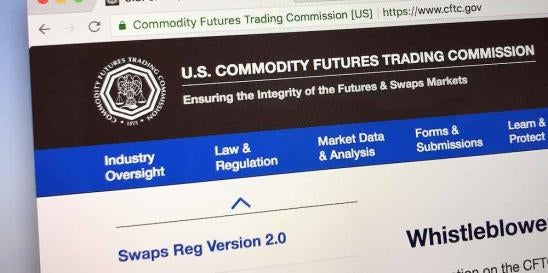This post is the next installment of a multi-part series on CFTC Regulation §1.44, as proposed by the U.S. Commodity Futures Trading Commission (the “CFTC”) on February 20, 2024 (the “Proposed Rule”).
Sub-paragraph (g) of CFTC Regulation §1.44 permits a futures commission merchant (“FCM”) to treat each separate account as a distinct account from all other accounts of the same customer for purposes of the FCM’s capital, risk management, and segregation calculations.
Absent the relief for separate accounts afforded by this sub-paragraph, an FCM would have to combine all of the accounts of a single customer for purposes of complying with these regulatory requirements.
As described by the CFTC in the proposing release, sub-paragraph (g) of CFTC Regulation §1.44 has several provisions that, “[A]re intended to ensure that an FCM treats each separate account as a distinct account from all other accounts of a separate account customer for purposes of the FCM computing its regulatory capital and segregation of customer funds.” Similarly, other provisions require an FCM to treat separate accounts consistently for risk management purposes.
Stress Testing and Credit Limits
An FCM that is a member of a derivatives clearing organization must conduct stress testing and establish credit limits in compliance with requirements of CFTC Regulation §1.73. Generally speaking, stress testing is intended to permit an FCM to better understand the scope of potential customer losses in extreme market conditions. Credit limits are intended to manage an FCM’s financial risks of carrying accounts of a customer, including the risk that a customer will be unable to meet its margin requirements.
The Proposed Rule addresses the application of stress testing and credit limit requirements to separate account customers. Specifically, proposed CFTC Regulation §1.44(g)(1) requires stress testing to be performed, and credit limits to be applied, on both an individual separate account and on a combined account basis. The Proposed Rule will expand the scope of CFTC Regulation §1.73 by requiring all FCMs (i.e., both clearing and non-clearing) to conduct stress tests in respect of separate accounts.
In short, this approach is intended to permit the FCM to anticipate and mitigate the occurrence of the types of events that would be inconsistent with the ordinary course of business of the separate account or the FCM, as more fully discussed in Part 7 of this series.
No Offsets across Separate Accounts
An FCM must determine its net capital in accordance with the requirements of CFTC Regulation §1.17.
Proposed CFTC Regulation §1.44(g)(2) requires an FCM to calculate margin for each separate account of a separate account customer independently from margin requirements for all of the other separate accounts of that customer without any offsets or spreads recognized across the accounts. In effect, the FCM must treat each separate account independently when computing capital charges for undermargined customer accounts in calculating its net capital.
Further, proposed CFTC Regulation §1.44(g)(3) requires an FCM to record each separate account of a separate account customer in the FCM’s books and records as a distinct account of the customer. The FCM must record each separate account with a net debit balance or a deficit as a receivable from that separate account customer, with no offsets between the other separate accounts of the same customer.
Separate Accounts and the Segregation of Customer Funds
An FCM must maintain a sufficient amount of funds in segregated accounts to meet its total obligations to customers. Different segregated accounts must be established for each respective type of customer group (futures customers, cleared swap customers, and foreign futures and options customers), as per CFTC Regulations §§1.20, 22.2, and 30.7, respectively (the “Segregation Rules”).
Proposed CFTC Regulation §1.44(g)(4) requires an FCM to treat each separate account as if it is the account of a separate entity, when calculating the amount of its own funds that must be maintained in segregated accounts to cover deficits or debit ledger balances pursuant to each of the respective Segregation Rules.
Separate Accounts and the Residual Interest and LSOC Requirements
The Segregation Rules also prohibit an FCM from using the funds of one customer to purchase, margin, or settle the positions of, or to secure or extend the credit of, any person other than such customer. Consistent with this prohibition, an FCM must maintain a sufficient amount of its own capital (referred to as a “residual interest”) in the applicable customer segregated account to cover the total undermargined amounts of its customer’s accounts by the deadline stated in the applicable Segregation Rule. The Segregation Rule that applies to segregation accounts of cleared swaps has additional requirements related to the protection of customer margin (referred to as the “legally segregated operationally commingled” or “LSOC” requirements).
For purposes of any residual interest or LSOC compliance calculations, Proposed CFTC Regulation §1.44(g)(5) requires an FCM to treat the separate accounts of a separate account customer as if the accounts were accounts of separate entities and include the undermargined amount of each separate account, and cover that undermargined amount with the FCM’s own funds. In effect, the CFTC stated that this aspect of the Proposed Rule, “would result in an FCM treating each separate account in a manner comparable with the treatment currently provided to customer accounts that are not separate accounts.”
Finally, pursuant CFTC Regulation §1.11, every FCM that accepts customer funds to margin futures, cleared swaps, and foreign futures and options must implement a risk management program that, in pertinent part, establishes a residual interest target that will be held in segregated accounts for its customers. In addition, CFTC Regulation 1.23 requires an FCM to establish a targeted residual interest (i.e., excess funds) that is in an amount that, when maintained as its residual interest in the segregated funds accounts, reasonably ensures that the futures commission merchant shall remain in compliance with the segregated funds requirements at all times.
Proposed CFTC Regulation §1.44(g)(6) clarifies that an FCM must treat separate accounts of separate account customers as accounts of separate entities, in determining its residual interest targets under CFTC Regulations §§ 1.11 and 1.23.
Read Part 1, Part 2, Part 3, Part 4, Part 5, Part 6, Part 7, Part 8, and Part 9.



 i
i


